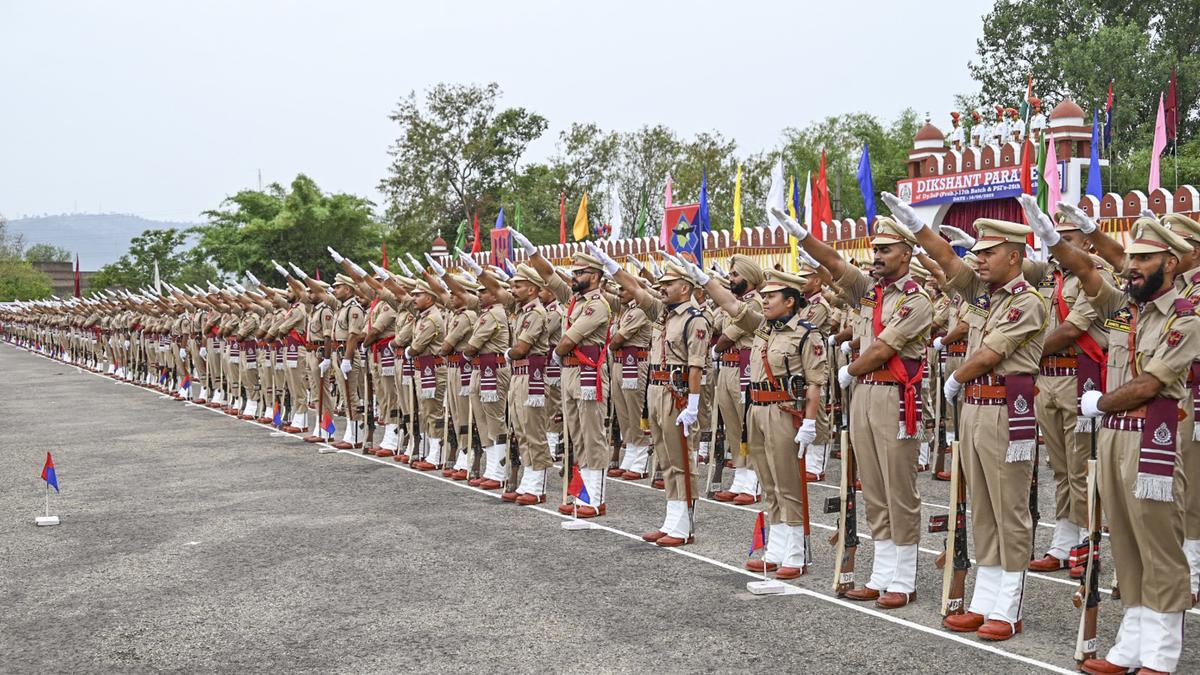On June 16, 2025, the Lieutenant Governor of Jammu and Kashmir (J&K), Manoj Sinha, emphasised that the eradication of terrorism from J&K was the government’s top priority. In his address on the occasion of the passing out parade at the Sher-e-Kashmir Police Academy, Udhampur, he called upon the J&K Police (JAKP) to utilise the modern technology to counter security threats, prevent radicalisation and triumph over adverse situations. He exhorted the JAKP to adopt a multi-pronged approach and harness the power of intelligence, community engagement, technology and inter-agency collaboration, based on good old beat policing.
Crucial asset
Mr. Sinha could not have been more accurate in underlining the role of the local police in fighting terrorism. The primacy of the local or State police as the fulcrum of counter-terror operations is a well established fact. The central forces — to include the armed forces and central police forces — always supplement and can never supplant the State forces. The strength, and hence the advantage of the local police in the given context, comes from the fact that its personnel belong to the region and know the terrain and demography like no outside force would know.
This intangible asset, as part of the repertoire of the local police, is mainly due to their connect with the local population, facilitating high-grade intelligence of terrorists who operate amidst the population. Can we deny the fact that the terrorists who were behind the Pahalgam strike on April 22, 2025, are still at large mainly due to an existing gap in human intelligence (HUMINT)? Or, for that matter, there indeed was a lack of HUMINT prior to the strike and that had it been present it could have averted Pahalgam? Unless we acknowledge the gap, learn lessons and proceed accordingly, it will be challenging to ward-off potential terror strikes.
It is upon the government to constantly improve the functional aspects of JAKP, which could contribute to the overall consolidation of the security situation. A beginning needs to be made by placing the JAKP under the command of the government that has been elected by the people.
The local population has the most intimate connect with the elected representative, who cannot be kept out of the loop as far as the security situation is concerned. Developments such as terrorist movements and overground workers’ activities in an area can never escape the notice of peoples’ representatives, who are one of the most crucial stakeholders in the security matrix. It is reiterated that locals always feel more comfortable to share information with their sarpanch or their Member of the Legislative Assembly (MLA) than with someone from a central agency.
Restore the democratic structure
J&K has a rich and vibrant democratic culture wherein the population has always participated in local body elections with much enthusiasm. In fact, the participation percentage in elections decreases as one goes up the structure to Assembly and parliamentary elections. Unfortunately, due to the fragile security situation, the local elected representatives — though elected from time to time — have never been empowered as in the constitutional provisions.
The democratic order in J&K needs to be restored, with all tiers in the structure of governance from panchayats/municipal bodies to MLAs and Members of Parliament activated and made responsible for security. In the laid-down tiered structure, the JAKP has a vital role towards participatory execution. If not, there will be an attitude of indifference on the part of peoples’ representatives, with a likely trickle-down effect — of an indifferent local population — which will be detrimental to counter-terrorism.
Policymakers will have to encourage a structured dialogue between police forces and local leaders to collaborate and address community concerns, gather information on terror-related activities and enhance public safety initiatives.
This partnership can lead to more informed decision-making and improved community engagement in policing efforts. In a diverse situation that exists in the various sub-regions of J&K, terrorism has a local flavour, contextualised by participation of local terrorist cadres operating with foreign terrorists. These diverse challenges will have to be tackled by respective local governance, against the one size fits all approach. The JAKP, with its basic unit at the thana level, has always been enmeshed with local governance to produce amazing results.
Bridging the gap
In the present situation of elected representatives having been kept out of the security matrix, the desired end will always be found wanting. The policy measure of restoring the control of the JAKP under the elected government will facilitate better accountability and responsiveness to community needs, ensuring that policing strategies align with the local population’s concerns and aspirations. Elected officials can play a vital role in bridging the gap between the police and the community, fostering trust and cooperation essential for effective law enforcement and counter terrorism.
By holding Assembly and parliamentary elections in J&K, we have acknowledged the agency of the people; the measures undertaken will remain an unfinished agenda if not addressed in an inclusive manner. More than terrorism, it is about granting a participatory governance model as against an elitist model, to the people. Mr. Sinha’s overall aim of community engagement will remain a pipe dream if elected representatives are not incorporated with vigour, to respect the decision of the people in electing them. An improved security situation will follow.
Shashank Ranjan is an Indian Army veteran (colonel) with substantial experience of serving in a counter-terrorism environment. He currently teaches at the O.P. Jindal Global University, Sonepat, Haryana
Published – July 18, 2025 12:08 am IST

